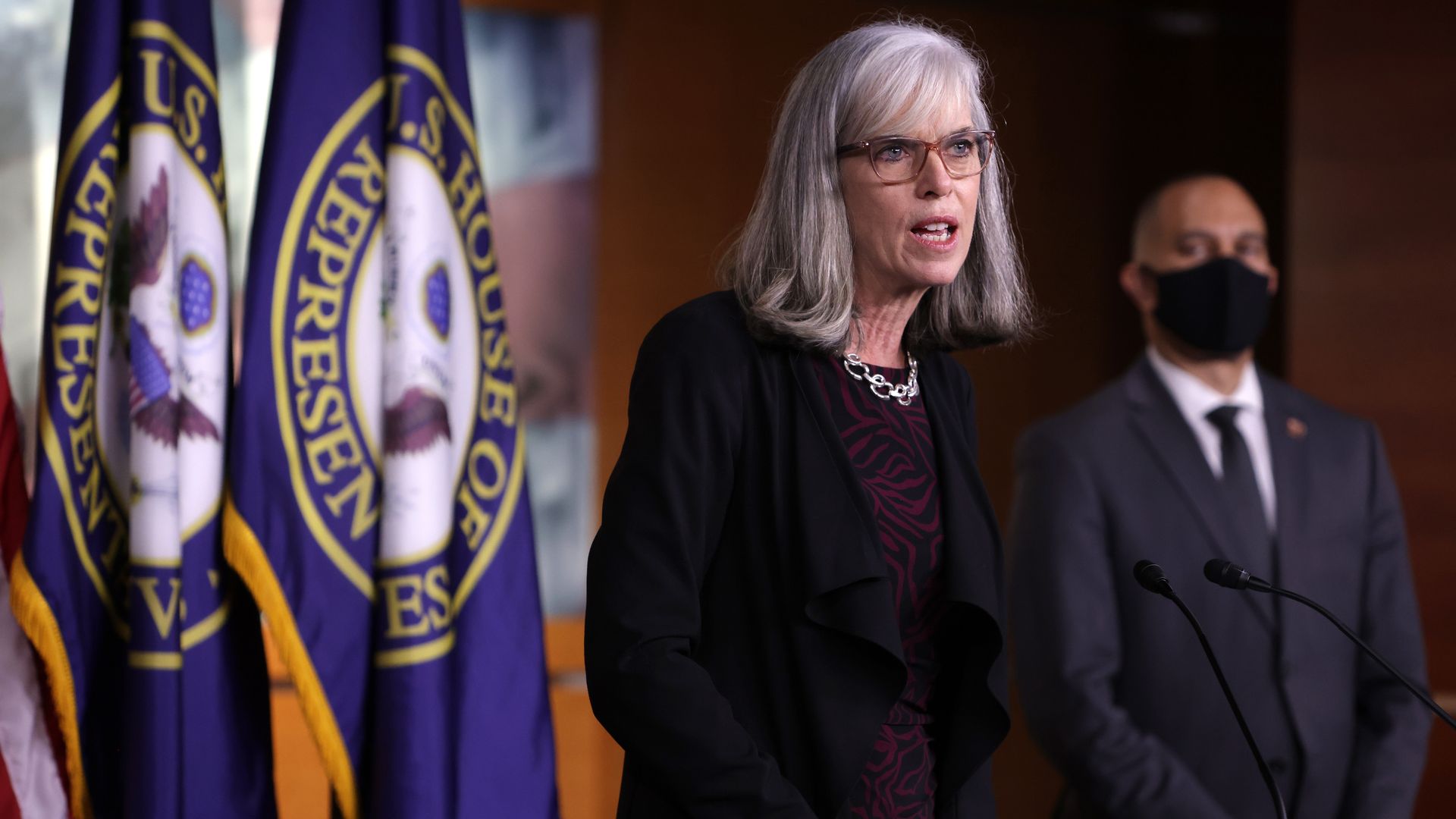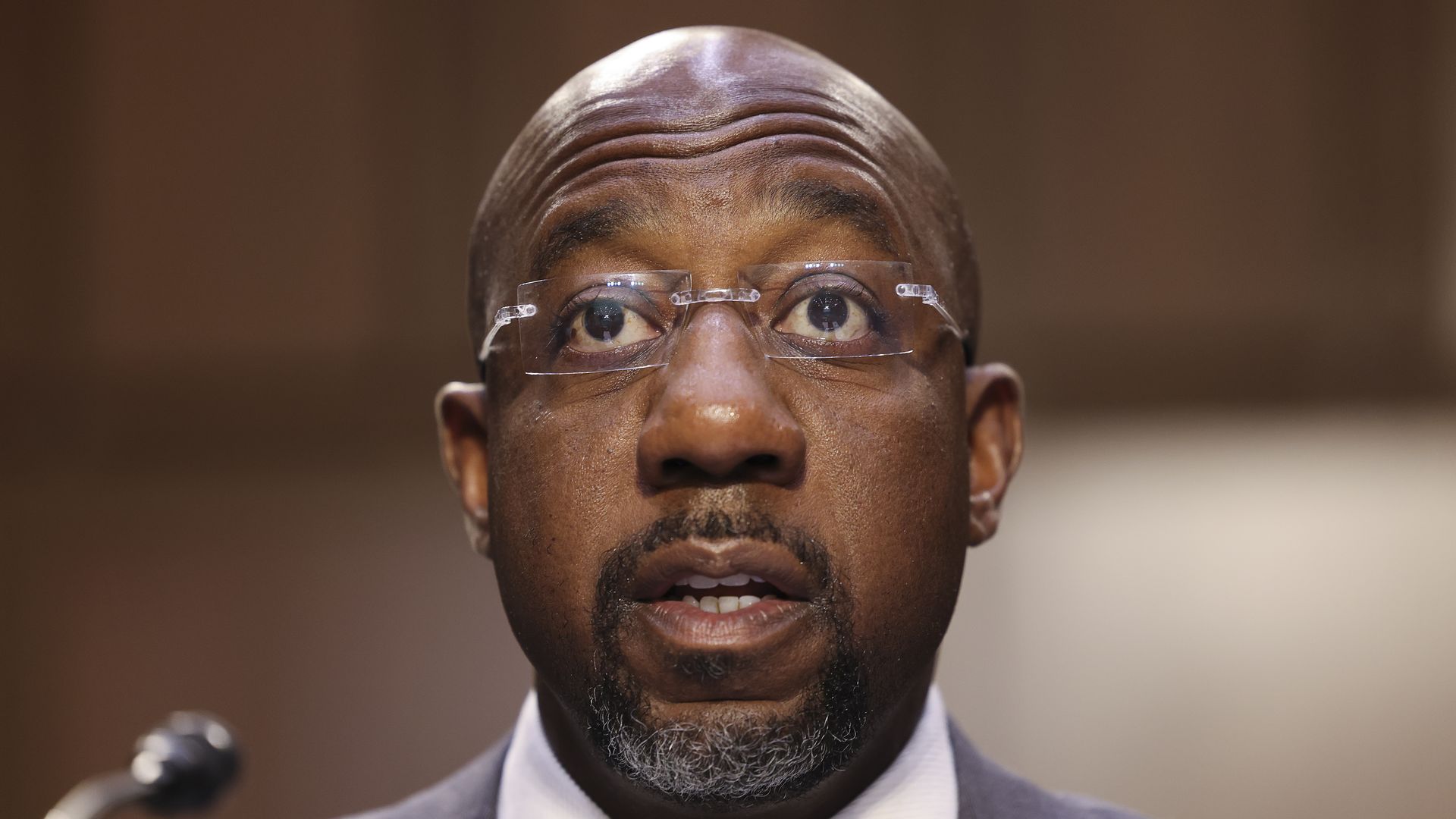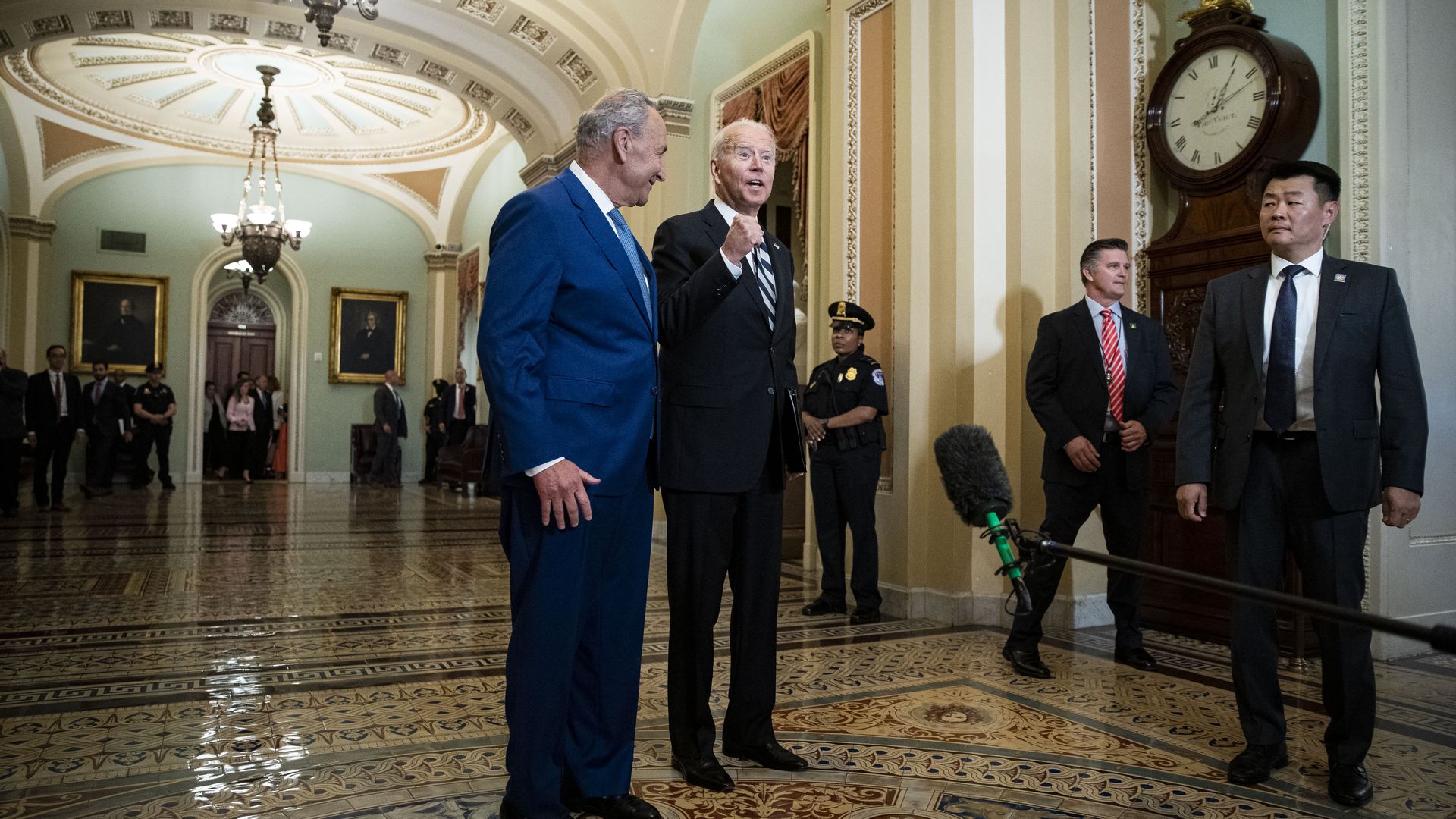| | | | | | | Presented By Lyft | | | | Axios Sneak Peek | | By Alayna Treene and Hans Nichols ·Jul 14, 2021 | | Welcome back to Sneak. The players are falling in line for an infrastructure deal. ⚡ Situational awareness: The House select committee on the Jan. 6 Capitol insurrection will hold its first hearing on July 27. Smart Brevity™ count: 1,369 words ... 5 minutes. Edited by Glen Johnson. | | | | | | 1 big thing: The infrastructure drug deal |  | | | Illustration: Sarah Grillo/Axios | | | | Senate Democrats have a new pay-for to finance a "soft" infrastructure bill: renegotiating Medicare prescription drug prices to save $600 billion — setting up a battle between progressives and well-capitalized drug companies, Axios' Hans Nichols reports. Why it matters: By targeting pharma, Democrats are opening up a funding stream President Biden didn't initially include in his $4 trillion Build Back Better agenda. It relied on hiking taxes on corporations and Americans earning over $400,000. - Democrats also pick a fight with an industry prepared to spend millions to fend off attempts to alter its lucrative reimbursement rates.
- Using drug-price savings to finance an already complex legislative package adds another powerful player to a game with no margin for error — complicating final passage of the legislation.
What they are saying: "It's time that the pharmaceutical industry realizes that the federal budget is not a cow to be milked," Sen. Elizabeth Warren (D-Mass.) told Axios. - Sen. Bernie Sanders (I-Vt.), chairman of the Senate Budget Committee, not only confirmed the $600 billion figure but suggested it was slightly higher.
The big picture: Renegotiating Medicare drug prices has long been a goal of Democratic politics, but the industry has successfully thwarted efforts to cut its profits. - In May, the path ahead for the House's drug pricing bill — HR 3, the technical name for a measure allowing Medicare to negotiate prices — suffered a blow when 10 centrist Democrats signaled their opposition in a letter to House Speaker Nancy Pelosi (D-Calif.).
- In the Senate, any bill would face an even heavier lift, because it would require the support of all 50 Democrats.
Driving the news: Democrats are proceeding with a two-track infrastructure process: a $579 billion infrastructure "hard" package to pay for roads and bridges, and a Democrat-only, $3.5-trillion, tax-and-spending plan covering other concerns like climate change and child care. - Democrats working on the bipartisan component insist they're closing in on a deal, Axios' Alayna Treene reports.
- "I am optimistic that we can resolve the remaining issues and be in a place for floor action next week," Sen. Chris Coons (D-Del.) said.
- Sen. Jon Tester (D-Mont.), a key negotiator, echoed the same timeline.
Between the lines: The industry is counting on Democrats like Sen. Bob Menendez (D-N.J.), whose state is home to many drug companies, to fend off any challenges. Menendez was noncommittal. - "I got to look at the whole package," he told Axios.
Keep reading. |     | | | | | | 2. Katherine Clark's path to speaker |  | | | Rep. Katherine Clark (D-Mass.) speaks as Rep. Hakeem Jeffries (D-N.Y.) listens before last year's House leadership elections. Photo: Alex Wong/Getty Images | | | | Rep. Katherine Clark's career-long habit of making friends has the Massachusetts Democrat in contention to be the next speaker of the House, Axios' Sarah Mucha writes. Why it matters: Speaker Pelosi has already suggested this is her final term in that job, but there's also continued speculation she'll accept an ambassadorial nomination to Italy or the Vatican that would spark an earlier succession vote. - If that happened, Clark would be thrust into a race with, among others, Rep. Hakeem Jeffries (D-N.Y.), the House Democratic caucus leader.
- Clark has built up a pile of chits in just under eight years in Congress, rising to assistant speaker — her party's fourth highest-ranking slot in the House, and just one notch behind Jeffries.
- Bonds she's made helping freshmen members settle into their new jobs have not only given her a network of friends and supporters but loyalists she can tap in a speakership battle.
Clark won't have any of that talk right now. During an afternoon Axios spent with her in her Greater Boston district this month, Clark continually turned the conversation back to her legislative focus — child care. - She also displayed the type of raw political skill John McCormack and Tip O'Neill used to become the most recent of the eight Massachusetts members to ascend to House speaker, notes Axios' Glen Johnson, a longtime Statehouse correspondent in Boston.
- "I think there is something about women's leadership styles that are built on listening, building consensus and listening not just to people — our constituents — but also to my colleagues that come from different districts, have different concerns, different pressures than I do," Clark said during a break in a Cambridge, Massachusetts, ice cream shop.
Clark deflected when asked if she's the best person to be the next speaker. - "I don't know," she said, "but I can tell you that those are going to be tall stilettos to fill."
While outwardly dismissive of a strategic rise through the ranks, her actions reveal a well-honed, practiced and careful politician. She also has a "shine-theory" leadership mentality: investing in members so they may succeed and then, as a result, allow the entire Democratic caucus to "shine." - As assistant speaker, she holds monthly dinners for freshmen members.
- Clark's team meets with chiefs of staff on a regular basis to ensure all teams' needs are met.
- And recently, they started a weekly newsletter to highlight the successes and innovations of different members of Congress.
Keep reading. |     | | | | | | 3. By the numbers: Senate staff diversity |  Data: Senate Diversity Initiative; Chart: Will Chase/Axios Thirty-eight percent of the staff members for Senate Democrats identify as non-Caucasian — up from 35% in 2020, according to new data released by the caucus and reviewed by Axios' Stef Kight. By the numbers: Sens. Brian Schatz and Mazie Hirono (D-Hawaii) have the least-white staff teams, with around half identifying as Asian American/Pacific Islander and nearly a quarter as Native American. - It reflects the state Schatz and Hirono represent, which is 48% Asian American, Native Hawaiian and Pacific Islander, according to census data.
- Two freshmen senators — Sens. Raphael Warnock (D-Ga.) and Alex Padilla (D-Calif.)— come in third and fourth for staffs with the most people of color, and most senators in the top 10 are people of color themselves.
- Some 14% of Democratic Senate staffers identify as LGBTQ, according to the same data.
|     | | | | | | A message from Lyft | | Drivers want flexibility – so maintaining independence is essential | | |  | | | | Flexibility is crucial to drivers. It allows them to earn around their numerous other commitments and be available for those in their care. - 57% of drivers with Lyft are caregivers for family members or other loved ones.
Learn more in Lyft's Economic Impact Report. | | | | | | 4. Warnock vows voter protections |  | | | Sen. Raphael Warnock (D-Ga.). Photo: Evelyn Hockstein-Pool/Getty Images | | | | Sen. Raphael Warnock tells Alayna he won't let the Senate's fixation on passing a pair of infrastructure bills prevent it from also protecting the voting system that narrowly allowed him to win his new job. What they're saying: "We can walk and chew gum at the same time," the Georgia Democrat said. "Voting rights is bigger than the filibuster. And shame on us if we're more committed to a Senate rule (preserving it) than we are to the principles of democracy." - "I am not going to allow (voting rights) to get pushed aside," the freshman said.
- The president was seen walking with Warnock, arm on his shoulder, as he concluded his visit to the Senate Democratic policy lunch at the Capitol this afternoon.
Warnock's not alone on either front. - Sen. Tim Kaine (D-Va.) said he and several of his colleagues "feel like we're on a mission after Jan. 6."
- He reiterated he thinks the only way they'll be successful in passing voting rights legislation is by finding some sort of workaround to the filibuster: "It just strikes me as unlikely that we'll get their help in trying to protect the right to vote."
Between the lines: Democrats set the bar far too high with the "For the People Act," which was always far too ambitious to have a real shot at passing. Now, those who care about it are desperately trying to keep the issue relevant as it takes a backseat to infrastructure. - The problem is — and like most things in Congress — the more time that passes, the less political will there is to do anything.
- Texas lawmakers flew to Washington and held a series of news conferences — including another today — about their effort to block the Republican-controlled legislature in their state from passing a voting reform bill.
- Biden also delivered a speech in Philadelphia yesterday lambasting efforts to curb voting rights.
The big picture: The concern voiced by Warnock, Kaine and other Democrats is rooted in the jammed-pack agenda that senators confront through the end of the year. - Leaders see August recess as a deadline to ensure their highest priority agenda items see progress.
- As of now, infrastructure is dominating this period, and police reform — if negotiators can produce legislative text — sounds like the closest second.
Keep reading. |     | | | | | | 5. Pic du jour |  | | | Photo: Al Drago/Bloomberg via Getty Images | | | | President Biden returned to the Senate and Ohio Clock to address the Democratic policy lunch. - "It's great to be home, great to be back with all my colleagues," he told reporters.
|     | | | | | | A message from Lyft | | Drivers have spoken, and they want to maintain their independence | | |  | | | | Drivers use the Lyft platform to make work work for them. Outside of Lyft, they are parents, full-time employees, small-business owners, students, and teachers. They need the flexibility that independent contracting provides. Lyft is committed to what drivers want. | | | | 📬 Thanks for reading. A reminder your family, friends and colleagues can subscribe to this or any of Axios' other free newsletters by clicking here. |  | | It'll help you deliver employee communications more effectively. | | | | | | Axios thanks our partners for supporting our newsletters. If you're interested in advertising, learn more here.
Sponsorship has no influence on editorial content. Axios, 3100 Clarendon Blvd, Suite 1300, Arlington VA 22201 | | | You received this email because you signed up for newsletters from Axios.
Change your preferences or unsubscribe here. | | | Was this email forwarded to you?
Sign up now to get Axios in your inbox. | | | | Follow Axios on social media:    | | | | | |









No comments:
Post a Comment